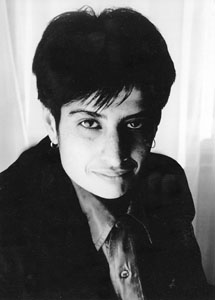![[Metroactive Books]](/gifs/books468.gif)
[ Books Index | Santa Cruz | Metroactive Home | Archives ]
Straight-Unlaced
Can gay people be diverse, too? Author Urvashi Vaid insists on it.
By Patrick Letellier
'I KNOW HUNDREDS and hundreds of people who don't see themselves as gay activists but who are very politicized. All these people are living out-of-the-closet lives and feel completely comfortable and entitled to that. And they're just outraged when they come up against a barrier. And us jaded old queers are like, 'Well of course you're running up against a barrier! The struggle continues, it isn't yet won!'"
So says activist and author Urvashi Vaid in a recent interview discussing the movement for gay, lesbian, bisexual and transgender (GLBT) rights. For more than 20 years Vaid has been active in the struggle for gay rights and through her award-winning book, Virtual Equality: The Mainstreaming of Gay and Lesbian Liberation, has helped a generation of activists see that struggle as part of a larger movement for social justice.
"Gay people do not fight for the freedom to live in a lavender bubble," she writes, "but in a more just society."
What Vaid draws attention to in Virtual Equality is the tension between gay activists who simply want rights, such as the right to marry, adopt children or serve openly in the military, vs. those who want liberation, that is, to fundamentally change the institutions of marriage, the family and society as a whole. Put another way, rather than fighting for a place at the table, liberationists want to replace the table all together. In fact, they want everyone to be sitting in the living room on the floor in a circle.
It's very Santa Cruz, it's very progressive and it's absolutely crucial if the gay movement is to have any kind of long-term success or meaning. And Vaid's voice is more important now than ever.
With the current gay rights battles over marriage and adoption and the proliferation of white, middle-class gay images in the media, from Will & Grace to Six Feet Under to the Queen of Nice herself, Rosie O'Donnell, the movement for GLBT rights begins to sound like a chorus of "We're OK because we're just like you."
It's no coincidence that Rosie O'Donnell didn't come out until she was married with children. She is seen as more a soccer mom than a radical lesbian activist, making her imminently more palatable to the mainstream.
But where does that leave butch lesbians and effervescent gay men who cannot pass for straight? Or those of us who simply do not want to assimilate into a narrow definition of gay that demands we be middle-class, consumer-driven, heterosexual look-alikes?
That's where leaders like Vaid come in. Though firmly rooted in leftist politics, her work has been recognized by the mainstream. In 1994 she was named one of Time magazine's "Fifty for the Future," a list of America's most promising leaders under 40, and Virtual Equality received the American Library Association's Nonfiction Book Award.
Throughout her career Urvashi Vaid has worked to define GLBT rights and liberation in the broadest terms possible. Her vision of social justice involves cultural transformation--not assimilation.
[ Santa Cruz | Metroactive Central | Archives ]
Copyright © Metro Publishing Inc. Maintained by Boulevards New Media.
![]()
 Open Season: Author Urvashi Vaid argues that gays should not have to fit one mold.
Open Season: Author Urvashi Vaid argues that gays should not have to fit one mold.
Urvashi Vaid will be in Santa Cruz on Monday, March 29, to give a talk to the community at the Del Mar Theatre titled "Sexuality and Its Discontents: What's Race, Class and War Got to Do with It?" Presentation starts at 7pm and is free to the public. The event is sponsored by UCSC's Center for Justice, Tolerance and Community, and the Gay, Lesbian, Bisexual and Transgender Resource Center. For more information call the GLBT Center at 459.2468, or visit their website at www2.ucsc.edu/glbtcenter.
From the April 24-May 1, 2002 issue of Metro Santa Cruz.